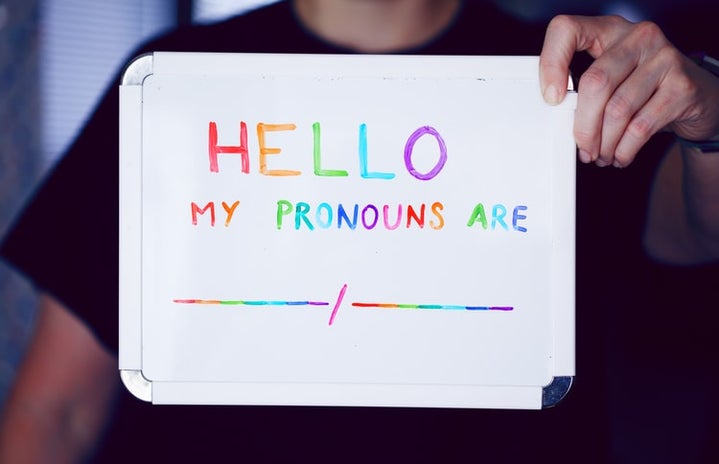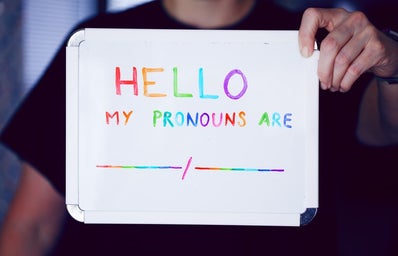In the year 2022, it is common to ask an individual what their pronouns are or how they wish to be referred to. While some find this to be an inappropriate thing to ask while giving “evidence” that there are only two genders, pronouns carry a lot of weight for someone if they do not strictly use the common he/him and she/her pronouns in their day to day life. Respecting one’s pronouns allows for someone to not misgender said individual. Let’s discuss this.
As a non-binary individual, pronouns are they/she, my pronouns mean everything to me. My pronouns are concretely connected to my gender identity. However, I have not always been referred to as the appropriate gender despite informing people of how I present myself. In fact, I have people in my life who strictly use she/her pronouns towards me or when talking about me to others even after I explicitly stated my preferred pronouns. That, my friends, is misgendering. Some may argue it isn’t, but if I feel as though someone is purposely not respecting my pronouns, then yes, they are misgendering me.
The history of pronouns is actually quite interesting. Originally, pronouns were used by neurodivergent individuals who did not feel comfortable fitting into the gender binary society had in place for so long. Pronouns are like tone indicators to some. While tone indicators allow a person to better understand how a message should be read, pronouns allow a person to better understand how someone is presenting themselves. Think of the quote “don’t judge a book by its cover” and apply it here. Just because someone may be masculine-presenting may not mean they go by he/him pronouns. People ask to ensure they are validating and respecting how someone presents themselves.
Not to be self-centered, but let’s return back to my story for just a second. Given that I have the anatomy that is synonymous with women and fem-presenting individuals, people are quick to assume I identify as female. Wrong. Growing up, I never truly felt comfortable when splitting off in gym class and having to join the girls’ side. What if I wanted to be on the boys’ team? Well, young Grace, that doesn’t matter because you aren’t a boy. Yet, I wasn’t a girl. To this day, that is how the weight of society feels on my shoulders specifically. It is hard to find a gender-neutral bathroom for me to use or even feel validated at my doctor’s office when the only options are male and female. This is damaging to a person who doesn’t follow the gender binary.
Now, misgendering is a touchy subject for some. I once had an argument with someone who, very bluntly, admitted that there are only two genders. That conversation will stay with me forever. Imagine talking to someone you once thought of as a friend about your gender identity only to be shot down immediately. Their evidence? They were a man who wore nail polish. Throughout that conversation, I was referred to as strictly she/her. I felt disgusting, broken, and invalidated. When someone brings up that they have been misgendered or felt as though they are being misgendered, the person opposite of them is quick to defend themselves. They don’t want to step on any toes or upset the balance of things. But, they don’t apologize. They are upset and mad at you for telling them they have done something wrong. Why? Is it an issue with ego, self-respect, or even embarrassment? To this day, I don’t know. I don’t know if anyone knows.
The easiest way to avoid this and avoid disrespecting someone solely for how they present themselves is to educate yourself. There are more and more people opening up and coming out about their gender identity. Google is one click away, so in theory, it should not be hard for someone to educate themselves. Now, here is where I personally have an issue. People seem to have this idea in their heads that gender-nonconforming people are supposed to educate others on this topic. That cis-gendered people are entitled to be students to our own gender identity and experiences. That idea is also harmful. I understand not having an idea on where to start educating yourself, so you turn to someone who has lived their own experience of it. However, some people associate the story of their identity with trauma or something darker. It can be harmful to rely on the “token member” of the trans or non-binary community. For some, coming to terms with their identity meant giving up their entire support system, giving up their childhood, no longer having contact with family members, amongst other things. Trying to make someone who has experienced this in their day-to-day lives can be detrimental to them. In some cases, people will be more than willing to help educate, but that burden should not solely be theirs to carry.
Well, I sort of fell off the beaten path trying to figure out what I wanted to say, so let me put everything into a little bubble that’s easier to digest. How someone dresses or presents themselves does not equal their gender identity or preferred pronouns. A gender-nonconforming person is not required to teach a cis-gendered individual about the gender-nonconforming experience. What is the best way to respect a person? Ask them before you assume. It will mean more to that person in the long run.


